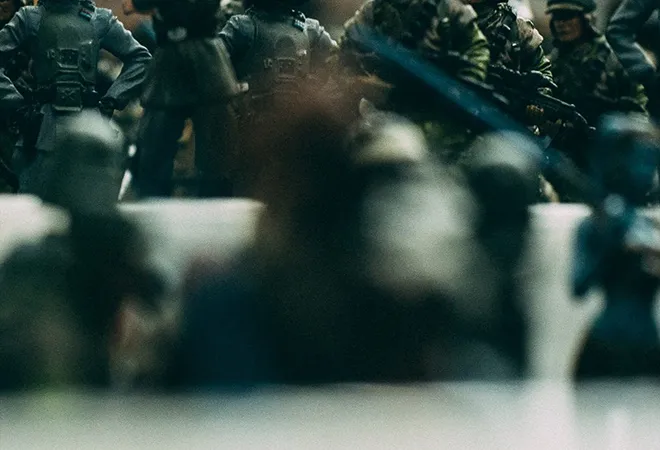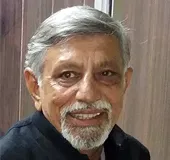
Modern battlefields are shaped by intelligence agencies employing multiple resources available to them. It is intelligence inputs which enables a commander to employ his reserves at the point of decision. While this may be the norm in battle, in Pakistan it is the ISI which is shaping the country to be run by the army, shielded by a civilian government. This raises the question of whether the ISI considers Pakistan and its political leaders akin to a battlefield.
The fact that the ISI head is nominated by the PM on the advice of the army chief does not imply that his loyalty shifts to the civilian government. It only implies that the army chief decides who is best suited to fulfil his plans and ambition for the country.
Anyone, despite all his power and authority even questioning the shaping of the country by the ISI or seeking to challenge the writ of the army, can be in for a rude shock. Nawaz Sharif as the PM experienced it. Not only was he removed from his post on trumped up charges but also pushed behind bars for the duration of elections, ensuring that the army chief’s protégé, Imran Khan, gains power.
Other major political parties saw the game, and realised whom the ISI was shaping as the next PM and hence refused to either comment or interfere. Nawaz Sharif was released as soon as the new government took office, clearly proving the intentions of the ISI and the army. Asif Ali Zardari too was threatened, withdrew from the race and has been largely ignored.
Despite all his power and authority even questioning the shaping of the country by the ISI or seeking to challenge the writ of the army, can be in for a rude shock. Nawaz Sharif as the PM experienced it. Not only was he removed from his post on trumped up charges but also pushed behind bars for the duration of elections, ensuring that the army chief’s protégé, Imran Khan, gains power.
The Islamabad High Court Judge, Shaukat Aziz Siddiqui, who laid bare the truth behind the intentions of the ISI shaping the political future of the country, in an address to the bar council, was sacked on the recommendations of the chief justice. He had stated:
“Today the judiciary and media have come under the control of ‘bandookwala’ (army). The judiciary is not independent. Even the media is getting directions from the military. The media is not speaking the truth because it is under pressure and has its interests. In different cases, the ISI forms benches of its choice to get desired results.”
He had spoken what many desired but feared.
The true reason for his removal was his strong anti-ISI and army views, which could have impacted the hold of the ISI, as being the senior most judge of the Islamabad High Court, he would have become its chief justice in November, when the present incumbent retires. The ISI would prefer anyone but him.
His sacking was on the recommendations of the same chief justice, Mian Saqib Nisar, who had ordered the removal of Nawaz Sharif. No other individual has been investigated and punished at the speed at which Nawaz Sharif was. It is slowly becoming evident that the sentencing was done on incorrect inputs. His case was a clear warning to all politicians: toe the army line or face a combined judiciary and ISI onslaught.
In no other nation are anti-government public protests resolved by talks led by army-controlled intelligence agencies, especially if the court directs the government to task the army to clear the protestors by force. In Pakistan, protests led by the Tehreek-e-Labbaik Pakistan in November last year were resolved with the ISI negotiating with the protestors. A video showing a serving Major General handing Rs 1,000 notes to each protestor made rounds in social media. The negotiated statement officially thanked the army chief for resolving the protest and forcing the government to accept their demands.
Politicians made comments alleging that the army played a key role in starting the protests and subsequently protecting the extremists by not intervening when ordered to. Even the Islamabad High Court objected to the terms of agreement, besides questioning the role of the armed forces. Justice Siddiqui stated, “It appears that the army was actively involved in the sit in. How can we allow this to happen with the government?”
Anti-establishment writers and bloggers have either been attacked, their residences ransacked or kidnapped to reappear after some time with complete amnesia of what happened. The few who were able to leave the country claimed attacks by ISI or its supporters. Taha Siddiqui, the reporter for WION, who was kidnapped in January this year, however managed to escape and narrate his incident, is the latest in the string of attacks on army critics.
Anti-establishment writers and bloggers have either been attacked, their residences ransacked or kidnapped to reappear after some time with complete amnesia of what happened.
The New York Times in an article in January, post the Taha Siddiqui incident, stated: “It has been an open season on journalists and critics of Pakistan’s military for years now. Disappearances, extrajudicial killings, torture and intimidation — all have been brought to bear, and in vast majority of the cases, no one has ever been brought to justice.” Those who have been kidnapped and then released, prefer leaving Pakistan for their own safety.
The recent court case involving Nawaz Sharif and The Dawn journalist, Cyril Almeida, is another classic example of shaping the nation. Cyril had faced the wrath of the ISI for the infamous dawn leaks of 16 October, wherein in a meeting Nawaz Sharif cautioned the army on the increasing international pressure demanding more action against armed groups, was released by The Dawn. It also resulted in multiple resignations and sackings, till the army was satisfied.
More recently, Cyril has been charged under treason, alongside Nawaz Sharif, for publishing an interview with him in May this year, wherein Nawaz Sharif had stated, “Should we allow them to cross the border and kill 150 people in Mumbai.” The pressure has been such that he has stopped his weekly columns in The Dawn. The case is in progress, which again is a warning to all others, never challenge the army or the ISI would target you.
Newspapers and TV channels are blocked and restricted on just a phone call by the ISI. Reporters were removed for an anti-army bias and media heads briefed on how to report on national security. Just last week, the Pakistan Electronic Media Regulatory Authority served show cause notices to news channels which aired a controversial talk by former senator Hasmi, who stated that the armed forces had “done nothing for the defence and betterment of the country’ and that weapons acquired for defence were ‘merely showpieces’.”
Pakistan remains the only country where the army controls one-fifth of the national economy, through its own enterprises.
Its population remains more fearful of the ISI and its goons than of terrorists. Democracy remains just a symbol, with the political leadership lacking authority. Every visitor to the country does a photo-op in Islamabad and rushes to Rawalpindi for serious discussions. The ISI, on behalf of the army, has shaped the country to the needs of the army chief.
The views expressed above belong to the author(s). ORF research and analyses now available on Telegram! Click here to access our curated content — blogs, longforms and interviews.




 PREV
PREV


